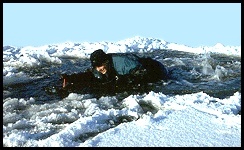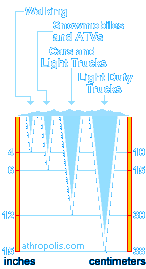
 Help! Help! Brrrr! HELP! When walking on ice with water underneath, always observe minimum thicknesses for safety on clear, solid ice (see diagram below right). Even though ice can be very strong and hard, it is not always safe to walk on. Here's why:
•
Ice hardly ever freezes or thaws at a uniform rate. It can be very thick in one spot while, only a few steps away, it can be dangerously thin. Use an auger to test the thickness.
• Snow is a good insulator, it slows down the ice forming process and keeps the ice from freezing hard. And, snow is heavy - it adds to the load on the ice. • New ice is usually much stronger than old ice. Direct freezing of still water makes stronger ice than that formed by melting snow, refrozen ice, or ice made by water bubbling up through cracks and freezing on the surface. Clear blue/black ice is stronger than milky white ice.
• Ice near the shore is weakest. The shifting, expansion and buckling action of the lake or stream over the winter continually breaks and refreezes ice along the shoreline. • River ice is usually weaker than ice on lakes. River mouths are dangerous because the currents undermine the ice. • Protruding logs, brush, or docks can absorb heat from the sun and weakening the surrounding ice.
Click pictures for more information and credits. Library: Arctic, Ice, Snow, Cold Places Links: Arctic, Cold Places Arctic Maps & Weather Reports |

|
DICTIONARY: Just "double-click" any unlinked word on this page for the definition from Merriam-Webster's Student Electronic Dictionary at Word Central. |

|
ARCTIC LIBRARY & GLOSSARY: Check this section for an index of the rest of the things you really need to know about the Arctic. |

|
ARCTIC MAPS & WEATHER REPORTS: Maps of the Northwest Passage, explorers' routes, iceberg sources, Nunavut, the Arctic by treeline, temperature... |

|
ARCTIC LINKS: Even more information! Links to sites related to the Arctic and "Iceberg: the Story of the Throps and the Squallhoots". |

|
GUIDE TO ARCTIC SUNRISE & SUNSET: How much sunlight or darkness is there in the Arctic on each day of the year? |
to is the property of their respective owners, and Athropolis is not responsible for their content.
